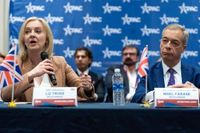In a significant development regarding the long-disputed Chagos Islands, negotiations between the United Kingdom and Mauritius appear to be nearing a resolution, which could see the islands returned to Mauritius after decades of colonial control. Newly released documents reveal that Attorney General Richard Hermer met with prominent legal figures advocating for Mauritian claims, raising questions about the UK government’s approach to this contentious issue.
On November 13, 2024, Hermer held discussions with Philippe Sands KC, Mauritius’ chief legal adviser on Chagos, and Dapo Akande KC, who has been vocal in supporting the return of the islands to Mauritius. This meeting came just a day after hundreds of Chagossians gathered in London to demand their right to self-determination, highlighting the urgency of the situation.
Sands, a close associate of Labour leader Keir Starmer, has been an outspoken advocate for Mauritian sovereignty over the Chagos Islands. In 2022, he made headlines by planting the Mauritian flag on the islands, symbolizing his commitment to their return. Akande, who served as Jeremy Corbyn’s legal adviser during the 2018 UK bombing of Syria, has also argued for the UK to comply with the International Court of Justice’s (ICJ) 2019 ruling that called for the islands to be handed back to Mauritius “as swiftly as possible.”
Despite the pressure for change, the UK government has remained tight-lipped about its legal strategy and the external legal advice it has sought regarding the negotiations over Chagos. This lack of transparency has drawn criticism, especially as it was reported that a deal to finalize the transfer of the islands could have been sealed by the beginning of March 2025, following support from former President Donald Trump.
The Chagos Islands, which were separated from Mauritius in 1965 to form the British Indian Ocean Territory, have been a point of contention since the UK established a military base on Diego Garcia, the largest island in the archipelago, in 1966. This strategic location has been crucial for US military operations in the region, but it came at a significant cost to the Chagossian people, who were forcibly removed from their homes between 1967 and 1973.
Historically, the UK’s control over the islands has been contested in international forums. In 2010, the UK created the Chagos Maritime Protected Area (MPA), which covers 640,000 square kilometers of ocean and aims to protect the region's biodiversity. However, leaked documents revealed that this move was also intended to prevent the resettlement of the displaced Chagossians, further complicating the narrative surrounding the islands' future.
The ICJ’s advisory opinion in 2019 stated that the UK must end its administration of the Chagos Islands, declaring that the decolonization of Mauritius cannot be considered complete until the islands are reunited with their rightful territory. This opinion was bolstered by a UN General Assembly resolution demanding that the UK withdraw its colonial administration from the archipelago.
As the negotiations progress, the UK government has faced backlash from various political factions. Tory leader Kemi Badenoch has publicly stated that it is not in the British national interest to “give away” the islands to Mauritius, a sentiment that reflects a broader reluctance among some UK officials to relinquish control over what they see as strategically vital territory.
However, the narrative that the UK would be “giving away” the islands rather than returning them is increasingly being challenged by advocates for Chagossian rights. Critics argue that this perspective dismisses the historical injustices faced by the Chagossian people and undermines Mauritius’s legitimate claim to the islands.
Supporters of the transfer contend that it is essential for justice and reconciliation, allowing the Chagossians to return to their homeland after being forcibly removed. The prospect of a new deal, where Mauritius regains control over the archipelago while the UK retains a 99-year lease on the Diego Garcia military base with a possible extension of 40 years, has sparked debate about the balance between historical accountability and current strategic interests.
As the UK and Mauritius inch closer to a potential resolution, the implications of this deal extend beyond mere territorial claims. It reflects the ongoing legacy of colonialism and the need for former colonial powers to confront their past actions. The Chagos Islands dispute serves as a reminder that the effects of colonialism continue to resonate today, impacting not only the nations involved but also the lives of individuals who seek justice and recognition.
Ultimately, the resolution of the Chagos Islands issue will not only determine the fate of the archipelago but also shape the future of UK-Mauritius relations and set a precedent for how former colonial powers address their historical responsibilities. With the international community closely watching, the outcome of these negotiations could mark a turning point in the long struggle for Chagossian rights and the decolonization process.



